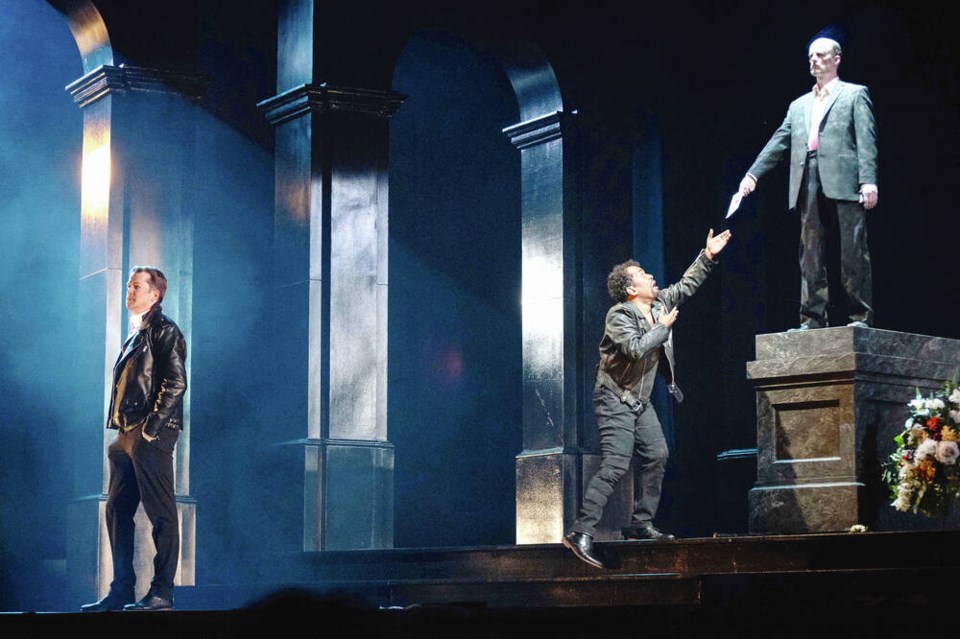In a post #MeToo era, what’s better than a rollicking romp about a swashbuckling sex maniac who claims to have bedded more than 2,000 women?
The maniac in question is Don Giovanni, the anti-hero of Mozart’s Don Giovanni, a towering masterwork of the operatic repertoire. Pacific Opera Victoria has opened a sassy interpretation of the 1787 romp with director Maria Lamont fast-forwarding it to modern times.
This production, well worth seeking out, has had to overcome growing pains. Don Giovanni marks the first time POV has staged a show at the Royal Theatre in two years. The reason for the hiatus, of course, was COVID. (Provincial health officer Bonnie Henry attended Wednesday’s opening night performance. The theatre seemed almost full with about 25 per cent of the audience wearing masks.)
Another hurdle for POV was switching out its lead performer. In what the company described as an “emergency artist replacement,” Lucia Lucas, the American transgender baritone originally enlisted to play Don Giovanni, has been replaced by Canadian bass-baritone Daniel Okulitch. The company has been close-lipped about the reasons for this — one source close to the production said the artist left for “personal reasons related to health”.
It might have been fascinating to see how Lucas, who recently made her Metropolitan Opera debut, handled a muy macho role such as Don Giovanni. Happily, the tall and handsome Okulitch does a fine job. Strutting the stage in a tricorne hat and white feather boa, the singer presents the character as an incorrigible libertine who’s oddly likeable despite lacking a moral compass.
Director Lamont says she intends this Don Giovanni to be “sexy and terrifying, defiant and cruel, yet never losing the sensitivity and humanity that is the hallmark of Mozart’s tremendous art”. Okulitch, no stranger to the titular role, is the personification of this.
On opening night he particularly impressed with a seductive and sensitive interpretation of Deh, vieni alla finestra. Equally fine was Là ci darem la mano, his flirtatious duet with peasant girl Zerlina played by Cecile Muhire, a pleasingly light-voiced soprano. This song exemplifies Mozart’s exemplary skill in making the music mirror the words. As Zerlina succumbs to Don Giovanni’s seduction, the pair fall into parallel rhythms like waves lapping in perfect tandem. And then they collapse to the stage in a lascivious embrace.
There was much intermission chatter about the wit and cleverness of the direction. Lamont doesn’t gloss over the opera’s dramatic elements — at the same time, there’s a lot of irreverent fun afoot. Typically, when Masetto (Peter Monaghan) accuses Zerlina of being overly flirty, she belts him with a resounding Will Smith-style slap. Don Giovanni’s female accusers are greeted by camera-wielding members of the press; Donna Elvira waves her iPhone to see if anyone recognizes his photograph.
The onstage hijinx are tinctured with a pinch of decadence. Don Giovanni’s servant Leporello (the excellent Justin Welsh) wears a studded dog collar and a black motorcycle jacket. A dance sequence at Zerlina’s wedding features gaudily costumed locals who resemble 2 a.m. refugees from a louche nightclub. One celebrant wears fishnet stockings; another has a jacket with crossbones and the slogan: “I’m a mess.” Choreographed by Jacques Lemay, they dirty-dance within an enjoyably depraved atmosphere.
Christina Poddubiuk’s set is bold and stylish; her costumes are irreverent and cheeky. The set is dominated by an arched Italianate building painted a glossy black. The production’s colour scheme is predominantly black, white and red — with bright hues injected into party scenes to make them pop.
Other highlights included Welsh’s rendering of Leporello’s Catalogue Song in which he itemizes his boss’s amorous exploits: 1,003 women in Spain, 640 in Italy and so forth. Welsh delivered the famous aria with great verve and vivacity — his comic acting, highly physical, makes this production a delight throughout.
No one sang better than soprano Tracy Cantin as Donna Elvira, the cast-off lover who responded to the Catalogue Song by seizing a bottle of wine and glugging it. Cantin impressed with her judicious displays of vocal heft, offering thrilling upper-register forays that filled the theatre, elsewhere navigating soft passages with exquisite control and a purring vibrato.
It’s very much an ensemble production. As Donna Anna, soprano Aviva Fortunata revealed a creamy timbre and earned some of the evening’s most enthusiastic applause. The technically demanding Non mi dir was notable for Fortunata’s secure high notes and nimble coloratura.
Tenor Owen McCausland, playing Donna Anna’s long-suffering fiance Don Ottavio, impressed with Dalla sua pace, notable for his lovely legato lines and nuanced phrasing. Rounding out the cast is bass-baritone Thomas Goerz, who plays a regal and chilling commendatore. The Victoria Symphony was briskly conducted by Timothy Vernon.
Don Giovanni continues at the Royal Theatre with Sunday matinee and an evening performance Tuesday.



